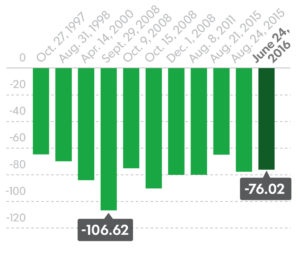The United Kingdom’s surprise decision to leave the European Union (known as Brexit) has led to uncertainty and confusion in international financial and manufacturing sectors. How can American companies take advantage of new trade opportunities arising from Brexit while protecting their interests from potential economic downsides?
What’s at Stake for American Economy Now That the UK Will be Leaving the European Union?
Let’s take a look at the impacts that Brexit will have on trade with various American industries.
Changes in Interest Rates and Currency Exchange Rates
In the short term, FUD (fear, uncertainty, and doubt) has taken hold, driving down the British Pound – which has, in turn, driven up the value of the US Dollar.
FUD makes American exports more expensive on world markets, so manufacturers who sell to overseas markets will have to adjust their currency exchange rate forecasts accordingly. Those American manufacturers dependent on British products will see a gain thanks to the lower Pound exchange rate.
What about Interest Rates in the Short Term?
Thanks to Brexit, it’s unlikely that American manufacturing companies will be facing an interest rate rise this fall. Janet Yellen, Chair of the US Federal Reserve, appears to have reversed earlier plans to raise US interest rates, due to the uncertain economy in Europe and predictions for a mild recession in Great Britain brought about by Brexit.
Will the US Experience a Slowdown or Mild-Recession as a Result of Brexit?
The preliminary employment numbers from June 2016 had economists concerned about an economic downturn in the US during the second half of 2016. However, news broke on Friday, August 5 that the US economy added 255,000 jobs during July, and earlier jobs figures were revised upwards, which has dispelled earlier concerns about an economic contraction. With US unemployment steady at 4.9%, we are very close to the figure – 4.6% unemployment – that many economists consider being the ‘full employment’ number.
If these strong employment numbers continue into the fall, it’s likely that the Fed will consider raising interest rates as we go into 2017.
Meanwhile, in Great Britain, the Bank of England is Fighting Off an Economic Slowdown
Canadian Mark Carney, who serves as Janet Yellen’s colleague as the Governor of the Bank of England, has been forced to address dismal leading economic indicators, such as the UK Markit Purchasing Managers’ Index (PMI) which dropped significantly in July. Economists are now predicting a mild recession in the UK in the second half of 2016.
On Thursday, August 4, Carney announced the Bank of England’s strategy to avoid a downturn. The Bank is cutting UK interest rates to 0.25% to stimulate demand; this will be accompanied by some ‘quantitative easing’ which will push more currency into the banking system. Worrisome for Carney are the UK’s public debt position (among the highest of industrialized countries) and their large, ongoing trade deficit ($191 billion USD in 2014).
Manufacturing companies that trade extensively with the UK will want to evaluate these changes and adjust their forecasts accordingly.
How Much Weight Does British Trade Have on the American Economy and Vice Versa?
If you are concerned about a British recession and how it might affect your manufacturing operations, it’s helpful to consider the relative size of our two economies.
The USA is Great Britain’s largest trading partner — in 2014, the UK traded $51 billion dollars of goods and services with the USA. But the inverse is not true: Great Britain is not even among the top five US trading partners (Canada at $241 billion, Mexico at $194 billion, China at $134 billion, Japan at $67.5 billion, and Germany at $61.6B billion).
MIT publishes an excellent visualization tool that allows you to explore the bilateral trade between the UK and the USA.
Top 5 Export Categories |
|||
Top 5 UK Exports to the USA |
Top 5 USA Exports to the UK |
||
| 24% | Machines | 24% | Machines |
| 18% | Chemical Products | 21% | Transportation |
| 17% | Transportation | 13% | Chemical Products |
| 11% | Minerals | 7.1% | Instruments |
| 6.7% | Instruments | 6.7% | Minerals |
| Link to Source Data UK > USA | Link to Source Data USA > UK | ||
TIP: Use the links above to access import/export data from 2014. Click on the “Depth” buttons to drill down into find the relevant statistics in your own market sector.
Concerns for Specific UK Trade Sectors
Depending on which sector you trade in, things might be better or worse with a pending exit of the UK from Europe. Let’s take a look at the UK’s key industrial sectors that will likely experience the most changes due to Brexit:
Potential Changes to the UK Financial Services Sector

The modern UK economy is heavily weighted toward services (nearly 80%) with financial services responsible for approximately $155 billion USD in 2011. If financial trading with the EU common market is restricted, major financial institutions will follow through on plans to relocate key elements of their London offices to EU cities like Dublin, Paris, Frankfurt, and Amsterdam. If this happens across the board, the UK could lose significant wealth in the coming years.
What to watch out for: Investment Bank Goldman Sachs announced on Thursday, August 4 plans to restructure their London operations to move key staff to the EU. American financial companies considering relocating to the UK may have to face up to the fact that a single operation in London may no longer be able to service the entire Continent.
Potential Changes to the UK Real Estate and Construction Sector
Low Pound rates have temporarily brought in foreign buyers for expensive London real estate. However, the long-term outlook will significantly weaken if London’s financial interests (known as The City) lose their EU Passport financial trading rights. Construction in the UK has already taken a hit in the immediate days after the Brexit vote, and economic confidence indicators remain low.
What to watch out for: American companies servicing the UK Construction Sector will have to contend with a high US dollar and potential turmoil in the commercial real estate market. If London’s financial services market is restricted from free trade with the EU, then income loss in the UK will send the residential construction market into major recession.
Potential Changes to the UK Pharma and Health Care Sector
The UK’s National Health Service (NHS) does not operate in an open market like the US healthcare market. However, the UK is a major developer of Pharmaceuticals – with industry-leading names like AstraZeneca, which US-based Pfizer recently tried to acquire in a reverse takeover scheme. Concerns for the UK’s long-term competitive prospects in Pharma are mounting, however, due to the loss of important EU grants for basic research (e.g. the Horizon 2020 program among others), and the potential for diminished cooperation with European scientists who will no longer have freedom to perform research in the UK by right.
What to watch out for: American companies that are dependent on trading with UK Pharma companies should watch to see if the level of innovation tapers off due to lower investments in drug and health care research. Reduced freedom of movement will also create dramatic shortages in the NHS which rely extensively on foreign doctors and nurses for staffing.
Potential Changes to the UK Energy Sector
The current low price for crude oil has undermined Scotland’s North Sea income and could dampen enthusiasm for a second independence referendum for Scotland to remain in the EU. Unlike Germany, and its ‘Energiewende’ plan to use only clean, renewable energy sources, the UK is highly dependent on Oil, Gas, and Nuclear. However, Prime Minister Theresa May has put a major French / Chinese nuclear project on hold for further review, which may have broad implications for the UK’s reputation as a free-trading economy.
What to watch out for: Will the UK government allow the French / Chinese Hinckley nuclear project to move forward or will it be cancelled? This will provide an early indication whether Prime Minister Theresa May plans to pursue a “Britain First” industrial policy or if they plan to continue to champion free trade above all.
Potential Changes to the Technology and Tech Startup Sector
The UK has been a leader in innovative tech startups; however, like research funding in the Pharma industry, there are concerns that EU financing for new technology startups will not be replaced by the UK’s funding sources once the UK leaves the EU. Many of these startups also have founders and key staff from different European nationalities that were attracted to London in particular. Berlin may be one beneficiary if the London startup ecosystem frays post-Brexit. The recent sale of chip innovator ARM to Japan’s Softbank does not seem to signal a particular trend; although some claim it is a sign other countries still want to invest in the UK.
What to watch out for: American manufacturers in high-technology have become highly interdependent on advanced technologies coming out of the UK. Be on the lookout for signs that this sector continues to grow or becomes hobbled by lower investment in startup companies and research and development projects.
Potential Changes to the Transportation, Aerospace, and Vehicle Sector
One of the components in the ‘secret sauce’ of the successful Airbus passenger jet aircraft line is their high performing yet efficient wings, which are designed and manufactured in the Airbus facility in Broughton, Wales. The new trade agreements will complicate but not derail Airbus plans. Major new investments may be in France or Germany however. The UK’s Rolls-Royce aircraft engine factory will also face uncertainty until new trade agreements are set in place. The automobile manufacturing industry in the UK could see significant cost increases and manufacturing delays, as much of their production is interconnected with parts and assembly operations throughout the Continent.
What to watch out for: American automobile manufacturers GM (which owns Britain’s Vauxhall) and Ford UK have said they will need to raise prices on vehicles manufactured and sold in the UK to make up for lost profit due to the lower Pound exchange rate. If Brexit continues to push down profits from automobile manufacturing in the UK, the British plants may be some of the first to be shut down if overcapacity becomes an issue again – such as during the next economic downturn.
Uncertainty with International Trade Deals
Finally, let’s take a look at the ongoing negotiations for international trade.
Current Trade Deals under Negotiation |
||
Acronym |
Formal Name of Trade Deal |
Participating Countries |
| CETA | (Comprehensive Economic and Trade Agreement) | Canada and all EU Member Countries |
| TTIP | (Transatlantic Trade and Investment Partnership) | US and all EU Member Countries |
| TPP | (Trans-Pacific Partnership) | Twelve Pacific Rim countries: Australia, Brunei, Canada, Chile, Japan, Malaysia, Mexico, New Zealand, Peru, Singapore, United States, Vietnam |
Prior to Brexit, the UK would have automatically participated in the CETA agreement between Canada and the EU. But CETA was not approved before the Brexit vote. Now its passage looks more difficult, as the EU has decided to let each of its member states approve the trade agreement. If CETA fails to pass, it’s a strong signal that the EU will play hardball with Great Britain when it seeks a similar deal.
The final prospects for ratifying two trade deals involving the United States (TTIP and TPP) are hard to gauge — certainly, nothing will happen until after the US presidential election in November. As with the CETA agreement, Great Britain would automatically have been included in the TTIP agreement, but by leaving the EU, they will lose that opportunity and will have to start fresh negotiations.
It’s not impossible for the UK to make up for lost time. It has received encouraging words from its Commonwealth partners, like Canada, New Zealand, and Australia, whose leaders have expressed an interest in inking bilateral trade deals once the UK is out of the European Union. India also seems like a good candidate. But all of this will take time and cannot be made official until the UK is formally out of the EU in 2019 or 2020 at the earliest.
What are Your Predictions on the Impact of Brexit on American Economy?
Do you agree that market uncertainty will likely continue as the UK continues to fly in a long holding pattern? Or do you see blue skies ahead for Britain as they establish new trading agreements with countries across the globe?








